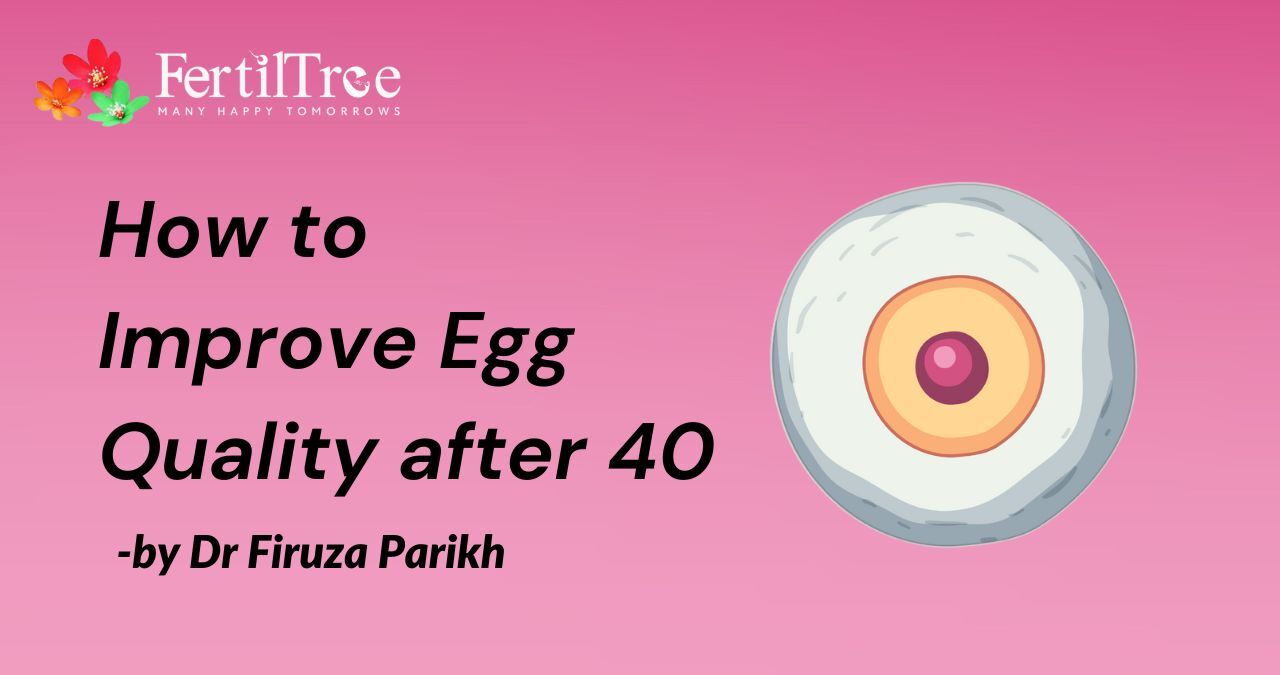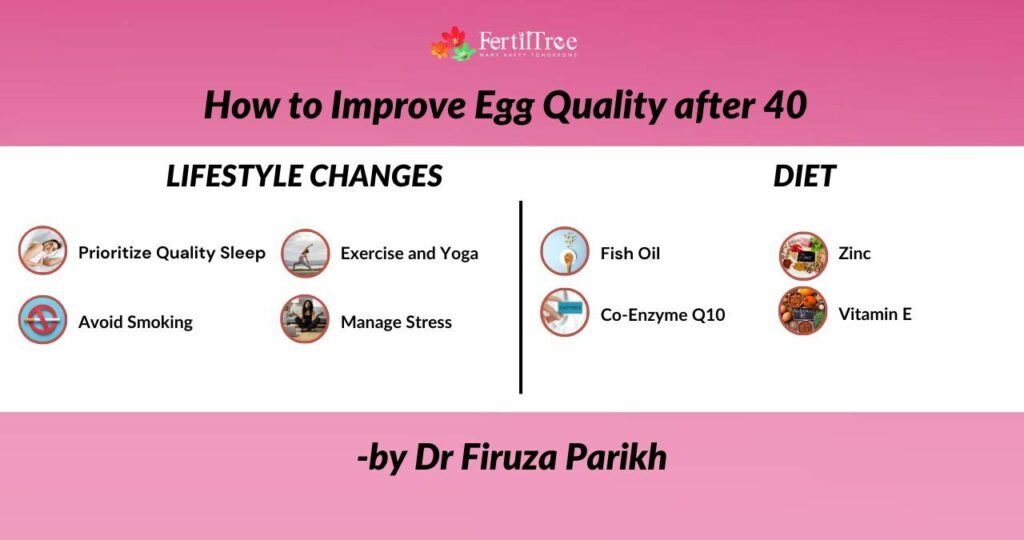
As a woman ages, the egg quality deteriorates., The odds of achieving pregnancy become in the 40s as compared to the 20s or 30s. Egg quality is one of the main contributing factors to pregnancy. According to a study, women who are 40 years of age or above have a higher risk of pregnancy complications, such as high blood pressure, preeclampsia, and gestational diabetes. So, how do you make sure that your egg quality still remains good even at 40? In this post, we share with you some tips on how you can improve your egg quality after you reach 40.
How You Can Improve Your Egg Quality After 40: Table of Contents
What is Egg Quality, and What Does Age Have to Do With It?
When we talk about egg quality, we’re referring to whether an egg is chromosomally “normal” (euploid) or “abnormal” (aneuploid). A chromosomally normal egg contains 23 chromosomes, and when it combines with a sperm, which also carries 23 chromosomes, the resulting embryo will have a total of 46 chromosomes, indicating that it is chromosomally normal.
As you age, the number of aneuploid eggs—those with either too few or too many chromosomes—increases in your ovaries. Conception can result in an embryo with an incorrect number of chromosomes. Typically, these embryos fail to implant in the uterus or lead to miscarriage. In certain cases, they may give rise to chromosomal disorders like Down syndrome, marked by an extra copy of chromosome 21.
At the age of 30, about 70% of your eggs are chromosomally normal. By the time you reach 35, approximately 60% of your eggs still maintain chromosomal normalcy. However, at the age of 40, only about 15 to 20 % of your eggs are chromosomally normal.
How Do You Know Whether Your Egg Quality Is Good Or Bad?
If you’ve been trying to conceive for six to twelve months without success, you might be concerned about the quality of your eggs. While there’s currently no direct test for egg quality, some tests can provide insights.
The levels of Anti Mullerian Hormone (AMH) reflect the ovarian reserve.
If you’re worried about your egg quality, have a conversation with your fertility specialist.
Read more:

How Long Will It Take To Improve Egg Quality?
From the moment they are selected from the waiting pool until ovulation, eggs go through a development period of roughly 90 days. That is why fertility specialists suggest that you consider opting for supplements and implementing diet/lifestyle adjustments at least 3-4 months before you try to get pregnant.
How to Improve Egg Quality After 40
While science may not have figured out the way to prevent the natural deterioration of eggs as we age, there are some precautions and actions you can take to ensure that they remain healthy, from lifestyle to dietary changes. In this section, which we will be dividing into 2 parts, let’s take a look at some of the ways to improve your egg quality so that you may still be able to get pregnant even when you reach or cross 40.
Lifestyle Changes To Improve Egg Quality After 40
Prioritize Quality Sleep: Adequate sleep is a must for your overall health. When we sleep, our bodies repair cells, recharge our energy and release hormones that are vital for reproductive functions. This will make way for the development of healthy and high-quality eggs.
Melatonin, a hormone produced at night, plays a vital role in sleep regulation and also supports egg quality. Research suggests melatonin benefits reproductive functions and aids in oocyte quality, ovulation, and embryo development. To naturally increase melatonin production, we advise that you maintain a healthy diet, try to manage your stress, and limit your screen time before you go to bed.
Avoid Smoking: Smoking isn’t good for your overall health, and it can harm both the quality and quantity of your eggs. Research shows that smoking increases the loss of eggs and makes them abnormal because of changes in their DNA caused by the chemicals in cigarettes. These eggs may not be of the best quality enough to get you pregnant.
Manage Stress: When you’re really stressed, it can affect your reproductive health and upset the reproductive hormones. The hormones responsible for stress, like cortisol and prolactin (which get released more when you are stressed) may prevent ovulation and slow down egg production.
Studies suggest that prolonged stress levels can deteriorate your egg quality and might affect your chances of pregnancy.
Exercise and Yoga: Doing simple exercises like walking, stretching and yoga is good for you. It helps lower stress, boosts blood flow to your reproductive organs, and keeps your immune system in balance. All of these things create a healthy space in your ovaries where your eggs grow and get ready. Just so you know, all your eggs are with you from the start and stay quiet in your ovaries until they’re ready to grow and be released.
Diet To Improve Egg Quality After 40
Fish Oil (Omega-3): Omega-3, commonly found in fish oil, is great for preserving fertility and making better quality eggs. Taking fish oil supplements will help in making sure that you get enough Omega-3s to protect your fertility and improve the quality of your egg.
Research shows that even short-term use of Omega-3 supplements can improve egg quality for women in their late 30’s and early 40’s.
Co-Enzyme Q10 (CoQ10): As you age, the levels of CoQ 10 decrease in all cells of the body. This is crucial for women over 40 trying to get pregnant.
CoQ10 is the main antioxidant & energy source that protects and supports mitochondria, which are energy sacs in your cells.
Mitochondria need to work well for high-quality eggs to develop. CoQ10 supplements can combat the decline in mitochondrial function and improve egg quality.
Other Vitamins and Nutrients:
- Vitamin E: This vitamin is a strong antioxidant. It reduces cellular stress and increases the blood supply to the follicles, which can be quite essential for high-quality egg development.
- Zinc: Along with certain B vitamins, Zinc plays a key role in DNA synthesis, which contributes to high quality eggs.
- Folate: Adequate levels are important for egg quality, maturation, fertilization, and implantation.
Final Thoughts!
As much as we would like to slow down or freeze time, we cannot. Our bodies change, and so do our egg quality as we age. While experts are still trying to figure out the remedy to fix this issue with the help of science, we can do our part in taking care of ourselves by making necessary and the right lifestyle changes and ensuring that our bodies get vital supplements. Hopefully, this post will help you understand just how to start as you reach your early 40s and are still planning to get pregnant.
Book A Consultation

